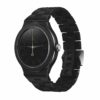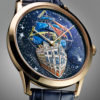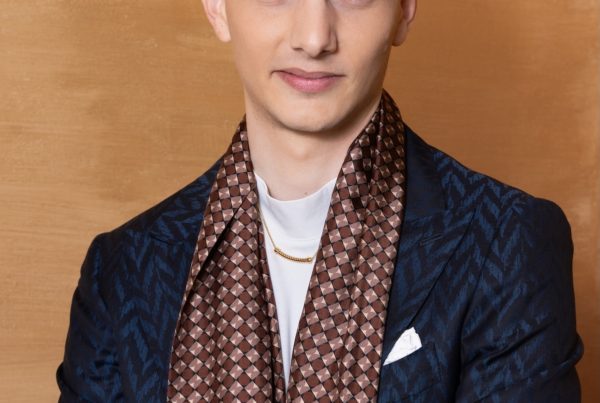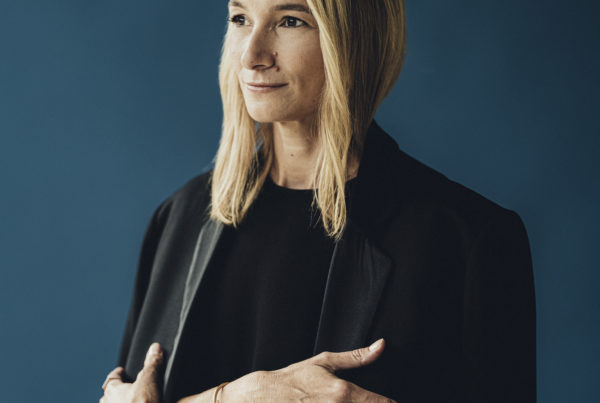Sébastien Jondeau, Karl Lagerfeld’s guardian angel
For twenty years, Karl Lagerfeld confided the smallest details of his life to Sébastien Jondeau. This ex-suburban boy became his right and left hand man and remained at his side until his last breath. In the book “Ça va cher Karl?”, Sebastien Jondeau tells his story, his origins and those twenty extraordinary years spent in the shadow of a genius. Photos: Buonomo & Cometti. Interview: Isabelle Cerboneschi

Sébastien Jondeau was born in the suburbs of Paris in 1975 and had no reason to leave. He had no reason to leave, except to risk being sent to prison, perhaps one day, for theft or God knows what. He was four years old when his life fell apart: under the influence of alcohol, his father threatened to kill his mother with a rifle. That day, she took her son under her arm and walked away forever. Direction: another life and another man. Sébastien Jondeau’s father-in-law owned a transport company and played a decisive role in his son-in-law’s life: it is indirectly thanks to him that the boy met the artistic director of Chanel and Fendi.
You’re right, you have to ask in life, otherwise you get nothing, Karl Lagerfeld
Let’s talk about this famous meeting. It was summer and Sébastien Jondeau was working for CST, his father-in-law’s company. On that beautiful day of July 1990, a client called on their services to transport some furniture. The teenager was part of the team of handlers.
“We arrived at 51, rue de l’Université. I have no idea where we are going or where we are. I’m in the courtyard of a private mansion, in my work overalls and my CST jacket, it’s 2pm, and I discover the place. For me, the place is a castle. I am aware that it is exceptional. We wait in the cobbled courtyard for someone to let us in. Inside, only 18th century furniture. We are still waiting. Clément, the butler, informs us that Monsieur is not here. We wait for another three hours. I want to get out. I’m restless.
The gentleman arrives. I remember his catogan. Lagerfeld wears big smoked glasses, he’s rather a nice guy. He apologises for the wait, says hello to us all and shakes our hands. He says to me: “You’re very young to be working like this.” I explain to him that it is the school holidays and that I have to work. I’m the only one he talks to a bit. I look like a kid. We move furniture, Karl directs the operations. In half an hour, it’s all done. At the end, he gives us each a “pascal” (500 francs). I can’t believe it. No arrogance on his part. He is cordial and simple, but what generosity! When I dismantle a 20-ton radio table, we share 200 francs each… 10 francs a kilo of copper, 1 franc a kilo of steel, 4 francs a kilo of lead…
We understood that this customer was really not like the others. “
Nine years would pass before Sébastien Jondeau began to work a thousand percent for this customer like no other… After serving his term in the army, he took on a series of jobs: he sold sandwiches at the Stade de France, was a boxer, a transporter, and a handler on building sites, including that of the Elhorria house, belonging to Karl Lagerfeld in Biarritz, in 1998. It was there, in the gardens, that he dared to make the request that would change his life. “I said to him that I would love to work for him.” And the creator replied: “You’re right, you have to ask in life, otherwise you get nothing.” On 20 December of the same year, Karl Lagerfeld handed him a letter, inviting him to make an appointment with his businessman in order to obtain a chauffeur’s contract. And the designer said: “Merry Christmas! ”
Sébastien Jondeau started in January 1999 and the adventure lasted twenty years. He didn’t belong to Lagerfeld’s world, but he has common sense, he is serious, honest, he likes girls, and he likes to fight. The designer taught him a thousand things, including the love of books, of beautiful objects, art and the practices of the world. Against his will, Jondeau integrated the codes of Parisianism. He also learnt English. In the multilingual world of the designer, who was fluent in French, English, German and Italian, speaking one language only was not enough.
I was a multi-Karl
The twenty years he spent at Karl Lagerfeld’s side were a series of firsts: his first trip to New York in 2001, to Saint Tropez in 2005, to Los Angeles, and to so many other places he could not have dreamed of discovering without his mentor.
In his book “Ça va cher Karl?”, co-written with French journalist Virginie Mouzat, he recounts the luminous moments, the trips, the personalities he met, the Christmases spent together, the first signs of Karl Lagerfeld’s illness in June 2015, in Ramatuelle, the last days, the last breath, holding his hand. It was he who dressed the designer in his eternal custom-made Hilditch & Key shirts, under a jacket signed Hedi Slimane, on the day of his funeral.
Sébastien Jondeau’s book is a testimony. It tells of Karl Lagerfeld as he never showed himself in public, far from the puppet he boasted of having become. A demanding boss, but generous, kind, even if he would hate to see this adjective attached to his name.
INTERVIEW
How would you define your role with Karl Lagerfeld?
Sébastien Jondeau : I define it quite simply: I was his left and right hand man. I was hired at the beginning as a driver and I had to take care of his security. I also played the role of factotum, that is to say I was in charge of his mail and I didn’t like that very much, of driver, of assistant. In fact I was a ‘multi-Karl’.
You were hired as a driver, but very quickly you became much more than that.
I was very motivated. I was always a hard worker, even before I worked for Karl: I wanted to succeed socially and materially. When you are a manual worker, like me, the best way to succeed is to dig and I was lucky enough to dig in the right direction. I was well educated and respectful and I put my heart into my work. He had confidence in me.
Did you feel the tipping point when you gained his trust?
Things happened naturally: the trust came little by little. He gave me the chance to try everything, to discover, to learn, to meet lots of different people. He gave me the power of speech and opened doors for me.

A 20-year professional relationship cannot exist without a balance between what you give and what you receive. What do you feel you have given him?
It would be pretentious of me to say that I gave him this or that… I gave him my time, that’s for sure. I can also imagine that I gave him a certain energy that he couldn’t find around him. When I came into his life, I was barely 23 years old. I came from a completely different universe from his, I was a free electron, I had a group of friends with whom I had an unbreakable bond. I brought him a vision of a certain life that he didn’t know.
Twenty years is a part of life. Why did you choose to write this book without following the chronology?
It’s a choice that we made with my co-author, Virginie Mouzat. It would have been too simple, and it didn’t suit me, to write it in chronological order. I am someone who goes off in all directions and I have to be controlled. I can be here with you and do three or four other things at the same time. I try to channel myself. Before I met Karl, when I finished the army, I was working in markets, in security, I was making sandwiches at the Stade de France, boxing fights, I was delivering all over Europe, I had four or five jobs at the same time. I find it hard to focus and that’s what Virginie Mouzat has done in the book. Except when I was working with Karl: I focused entirely on him.
There was something miraculous about your life with Karl Lagerfeld, but there was also a part that felt like a gilded cage. You were “callable” at all times.
That was the reason he paid me! I had to take care of him and you had to be dedicated body and soul. That was part of the deal. At first it was complicated when I had to change my schedules and cancel my holidays, but then it became natural. Very rarely could I do what ‘normal’ people do: organise dinners, aperitifs, weekends away. But I was fine with that. Yes, it was a gilded cage, but I could open it from time to time.
There was the public Karl Lagerfeld and the intimate one. Very few people got close to this man. You were one of them. Without betraying his secrets, what can you say about him?
I say quite a lot in the book. He looked a bit hard, hidden behind his sunglasses, but in reality he was generous and kind. He loved people but he didn’t want to show it. Karl was protecting himself. That was his real secret: he was a deeply good person. The few people who were driven out of his circle had betrayed him. He betrayed no one. Karl was a simple person in a very complicated world of glitter.

In your book you mention his “boys”, Brad Kroenig, Baptiste Giabiconi, Jake Davies. Who were they really?
Only Karl could answer you. They were sort of muses. They inspired him in his designs. At least from my point of view. They were just passing through Karl’s life, but he liked them very much, otherwise they wouldn’t have spent so much time with us.
Karl Lagerfeld had power, he knew it and liked to exercise it. You write: “Divide and conquer is also his privilege. “In what sense?
It is the privilege of all great men, of great bosses. Karl liked to play with his power in the professional field and in his private circle, but it was never mean. Divide and conquer was a way for him to keep control.
You had one chance in a million to work with him. At the signing of your book in the Galignani bookshop in Paris on 30 January, there was the usual fashion tribe, but also many young people from the suburbs who consider you a “role model”. What advice would you like to give to those who dream of meeting their pygmalion, their chance, their hour?
For people who come from the suburbs, like me, it is not easy to evolve in a different social environment and to live in a metropolis. My first piece of advice is to believe in yourself and your dreams. You have to be convinced that you are going to make it and fight to achieve a certain success and do something you like. This book is a message of hope. I have been very lucky, but you have to look for your luck, because it doesn’t just come.
Since the publication of your book, has Audemars Piguet returned the watch that Karl Lagerfeld gave you and that you gave them to repair
Not yet! I don’t know why…
Karl Lagerfeld didn’t want to talk about your future without him. Le Parisien revealed that you were in his will. Does this mean that he had made arrangements so that you wouldn’t have to worry about your future?
It’s still very vague, this story of the will. It’s a hodgepodge of issues that have yet to be resolved. He was generous to many people, but he had bad advisers and things were not handled properly. He was a creative person, he had other things to do. But indeed, he had thought of me.
You spent twenty years at his side and you watched him work. You also created small collections for Karl Lagerfeld and sportswear for Fendi. What did he say when he saw them?
It was the Karl Lagerfeld’s company who came to me and asked me to make these collections. Karl didn’t interfere at all during the design process, but he had given his approval. He was very proud when he saw the clothes made with the studio. I am not a designer, but I expressed myself in my own way. He never saw the line I did with Fendi. I think he would like it. He would say it looks like me. They are clothes between streetwear and sportswear. Even though I can’t draw well, I had the chance to observe the way he specified all the details, the materials, the colours. Seeing him create over the years left an indelible impression upon my mind. It was like going to school.
What do you like about this experience?
It has allowed me to develop something in me that I didn’t know I had: a creative side. I can continue to work with people I love, keep this family link with Lagerfeld and Fendi, and why not, one day with Chanel? Karl worked with these three houses without belonging to any of them. This freedom is a way of life that suits me. I couldn’t be locked in an office for nine hours a day. I have always been a free spirit. This need for freedom has meant that at certain times in my life I have chosen to be on the right side rather than the wrong side. I was very afraid of being locked up, if you see what I mean… I chose work over mischief.
Do you have any other collaborations planned?
No, but I have other projects that are starting to take shape. One of them is about Karl’s image. We had conceived it when he was alive, with Jean Roch (a figure of the Parisian and Tropezian night world, editor’s note), and Karl had validated it. I also have the idea of opening a hotel where people would come to do sport. Sport is my environment. I would like to create something that is mine and that will last.

Karl Lagerfeld’s illness lasted for years. You managed his hospital appointments with the doctors, you made sure that no information leaked out, you carried him on your back when he could no longer walk, and finally, you held his hand when he took his last breath. Did you come out of this unscathed?
His illness lasted for years, but he only suffered for the last few months. You never come out of it unscathed. That’s why I see a therapist. I lost a lot of people I loved before I lost Karl. He wasn’t just a boss, he was also a father, a friend, a mentor, a mother, a confidant. Our relationship was so many things mixed together! When you lose someone who has played all these roles, it leaves its mark.
What is life like after Karl?
Life without Karl is sad. He was very funny and gave me a lot. It’s true that there is no longer a gilded cage, which allows me to be free to do things that I couldn’t do before, but it’s more bland. It’s time to turn a page, keep all the good times and discover a new life. I would like to find love, meet a woman who suits me and create a family with her. It’s not a goal in itself, but I really want to.
So I give you your own advice: You have to believe and fight for your dreams.
Exactly. That’s what I’m doing right now! When you want to start a life with someone, you can’t arrive with all that baggage you’re carrying around. You have to lighten up.
Ça va cher Karl ? Sébastien Jondeau, with the collaboration of Virginie Mouzat, ed Flammarion, 27.01.2021

















